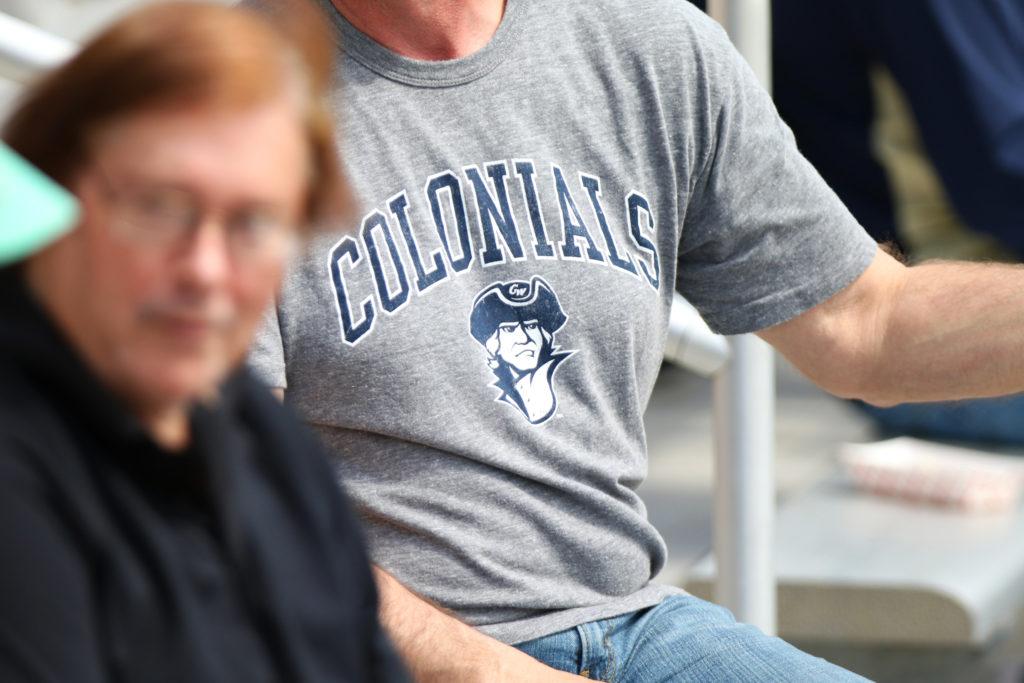A growing number of faculty are backing a student-led push to change the University’s nickname.
About 54 percent of voting students approved a referendum last month calling on GW to abandon the Colonials moniker, but officials have not publicly announced their views on the switch. In interviews with 21 faculty members, 17 said they supported a change to be more inclusive of minority and international students, but four said they opposed the change because they do not believe the term is problematic and it honors the University’s namesake.
Marcus King, an associate professor of international affairs, said international students hailing from countries where imperialists conquered native populations might be offended by the Colonials nickname. He said the University should “gradually” work to rename various institutions on campus boasting the nickname, like the Colonial Health Center.
“It sends the wrong message when an international student from a formerly colonized nation arrives on campus, and the University sends them to a place called Colonial Central in order to access administrative services,” King said.
Barbara Miller, a professor of anthropology and international affairs, said the term is reminiscent of the oppression of racial minorities across the globe. She said changing the Colonials moniker is “one step forward” in addressing several of the University’s diversity challenges.
“Colonialism in this country entailed genocide of Native Americans, enslavement of African Americans, bonded labor and destruction of the environment,” she said. “No one should be proud of that heritage.”
Miaochun Wei, an assistant professor of East Asian languages and literature, said she supports the nickname change based on her knowledge and reflection on the oppression Taiwanese people faced during hundreds of years of colonization. She said that even though some argue that the moniker has historical significance, the suffering of people under colonialism does not reflect “GW values.”
“You need to remember the history but also learn from the history,” she said. “That’s why I think it’s important to remove the Colonial.”
But faculty who oppose the nickname change said supporters are too sensitive and may be misinformed about the meaning of the term Colonials.
Jonathan Turley, a public interest law professor, said he was “surprised” and “disappointed” by the referendum. He said students misperceive the meaning of the nickname.
“The suggestion that ‘Colonials’ celebrates colonialism can only be maintained through willful blindness to its true meaning and history,” he said in an email. “Colonials is not a general reference to colonialism or a celebration of colonization. To the contrary, the Colonials fought against being a colony.”
Turley said supporters of the change should recognize that Colonials were not “advocates of colonization” but “defeated colonial rule” and were the “very symbol of self-determination.”
John Banzhaf, a public interest law professor who helped lead an effort to change the name of the Washington Redskins five years ago, said calls to change the Colonials moniker are an overreaction from students. He called the reaction “snowflake syndrome.”
Banzhaf said he supported the Redskins name change because the National Association for the Advancement of Colored People, the American Civil Liberties Union and many Native American groups – like the National Congress of American Indians – condemned the use of the name. He said the term Colonials is “nowhere near” as offensive as the Redskins.
“I don’t think it’s listed as a derogatory term in most dictionaries,” he said. “I don’t know of too many major organizations – civil rights organizations and American Indian organizations, who presumably would be the oppressed people – who condemn the words colonial or colonialists.”
Banzhaf said that before officials make a decision to change the nickname, they should gather feedback from other stakeholders, like alumni, because many of them support the University financially.
John Artz, an associate professor of information systems, said he does not find the term Colonials to be offensive, but he supports students taking an active role in University governance.
“They are here to learn and, someday, they will have to make important decisions on their own,” he said. “Making limited-impact decisions like this prepares them for decisions they will make when they are older, which may have a much greater impact.”
Meredith Roaten and Amy Liu contributed reporting.





